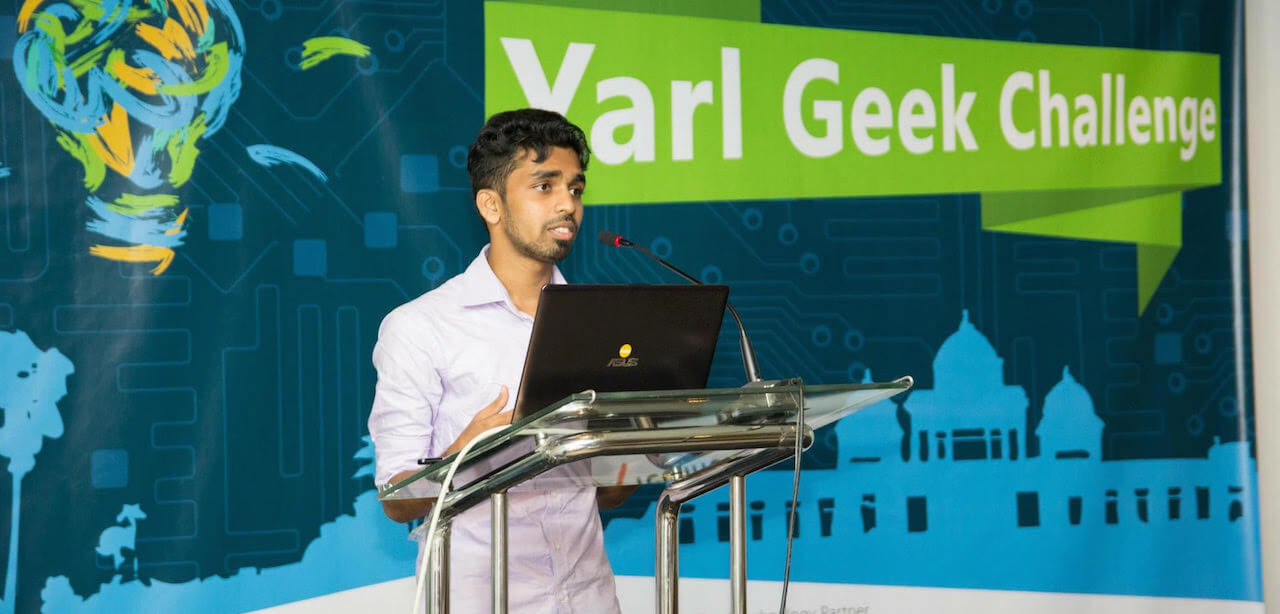
BusSeat.lk is a very well-known name to those who book long distance bus seats online in Sri Lanka. Despite the existing competitors in the market, BusSeat.lk has already marked its name in the IT based transport industry. So has the founder of the company, Prasanth Subendran.
Who is Prasanth Subendran exactly?
Hailing from Jaffna, Prasanth is an 'old boy' from one of the most famous and oldest schools in Sri Lanka, Hartley College. Having done Math in his GCE A/L, he studied Electronic and Telecommunication Engineering at the University of Moratuwa. He could have settled for a successful career as an engineer himself. Instead, he decided to build his own company and pursue the path of an entrepreneur.
While working in Singapore as an intern in his third year of University, he became very familiar with programs on startups and focused his energy on building his own environment. He was exposed to the idea of entrepreneurship after participating in the Yarl Geek Challenge(YGC). YGC is a hackathon that also acts as a platform for aspiring entrepreneurs to pitch and stage their ideas in front of investors. Prasanth happened to stumble upon the photos of YGC season two, and he decided to volunteer for this cause by contributing his knowledge of engineering hardware.
Prasanth’s Entry into YGC Season Three
RedKites was the name of the team, and the idea was online bus seat booking. With a team of five individuals, including Prasanth, RedKites entered into the hackathon. This was the first time the YGC investors announced one million in seed funding for the winners of the hackathon. RedKites, led by Prasanth, was determined to win first place and transform their idea into a successful startup in Sri Lanka. Their determination, passion and hard work enabled them to win the investment. Although the idea already existed as Redbus.in, the innovation presented in their idea, coupled with their determination to succeed helped them get the seed funding. The existing model is a successful one in India, and this fact helped the YGC investors to easily understand its application in Sri Lanka.
Once they won the hackathon, they had to do a follow-up with their investors for six months. This focused on finance projection reports, preparation strategies for MVP and networking with bus operators to signup for the platform. All this happened in parallel. The first six months were extremely difficult because it was essentially the probation period of their entrepreneurship. Most importantly, this six month of follow-up was designed to create changes in the business model, projections, and sometimes in the mindset of aspiring entrepreneurs.
Did the six month follow-up with the investors bring any change in the initial idea of RedKites?
Apparently, no. The team stuck to the core idea of the current BusSeat.lk. Yet, it has taken approximately a year for them to implement the complete idea fully because they were the first to market. Initially, bus operators were resistant to change to their new method even though they understood the ease and optimization behind their business. Building up the passenger website and bus operator application was completed within a short period, but it took them quite a long time to convince the bus operators to use the platform.
Although their core idea did not change, it did receive a great deal of of new support and was extended through channels like Dialog and Mobitel. The only real change that came into this startup was the team. Although it was a team of five that proposed the idea, eventually, it was Prasanth who ran the company with new colleagues, like his new CTO, Ramanan Sharma.
Most of the people in Jaffna are reluctant to start their own company, but not Prasanth.
Since the beginning, he wanted to see the full benefit of working on his own. Yet he didn't grasp the idea of becoming an entrepreneur until he stepped into YGC. Even when his friends stepped out of the startup idea, he was determined to take the idea further, and that determination is what keeps BusSeat.lk going to this day.
It is never an easy task to convince parents to let you start your own business. Prasanth had to tackle this huge task by convincing his family to support his risky initiative. Luckily, they were eventually able to understand the merits of an entrepreneurial business due to the success of two startups from his Electronics department at the time. When his path was clear from familial expectations, his journey as an entrepreneur began.
“Becoming an entrepreneur is not an easy task, but then if you are determined and passionate about it, you become one,” says Prasanth.Although Yarl IT Hub is working on the process of making Jaffna the next Silicon Valley, there are a few barriers to it. Prasanth offers his perspective on why some entrepreneurs do not set up their company in Jaffna.
“The startup ecosystem in Sri Lanka is still in it's early stages on investment mindset, and so is Jaffna. The access to investors to pitch the idea and following them up are mostly based in Colombo since they are from Colombo. Moreover, it is easy for the entrepreneur and his startup to be near to investors to set up meetings and discussions. Apparently, most startups would need investment to grow fast and supporting resources to operate. This is why there should be access to investment and ecosystem at a good level in Jaffna, so that wannabe entrepreneurs can work from their hometown. When those issues are addressed, I am pretty sure that people would want to launch their own startups in Jaffna. Still my points may be invalid for some startups depending on what type of business they do”.
Related Articles:
http://tamilculture.com/insight-jaffnas-growing-startup-culture/
http://tamilculture.com/tamil-kids-are-looking-up-where-their-parents-grew-up-with-google-street-views-sri-lankan-launch/

























